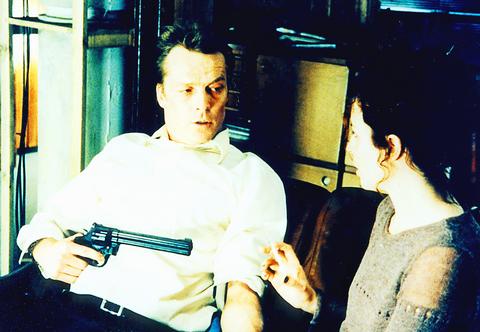Rated PG-13, directed by Bill Eagles, with Susan Lynch (Dorothy), Iain Glen (Tony), Jake D'Arcy (Train Guard), Rachel Weisz (Petula), Tom Mannion (Brian McMinn), Maurice Roeves (Ronnie McMinn), running time: 86 minutes.
A so-called comedic thriller, Beautiful Creatures shows that women can win in a world filled with misogynistic men. Dorothy just barely escapes her house after a beating from her boyfriend, Tony, when she stumbles upon Petula, who is herself taking a pounding from her boyfriend, Brian. Dorothy leaps to the rescue, knocking Brian over the head with a steel pipe. The two women drag him off, but he later dies when he falls out of the bathtub they've placed him in. They set up his death to look like a disappearance, all the while stirring up Thelma and Louise-sized problems that they predictably manage to overcome. Problem is, there's nothing comedic nor thrilling about watching the women become as sadistic as they men they struggle against.

PHOTO COURTESY OF LONG HSIANG

June 23 to June 29 After capturing the walled city of Hsinchu on June 22, 1895, the Japanese hoped to quickly push south and seize control of Taiwan’s entire west coast — but their advance was stalled for more than a month. Not only did local Hakka fighters continue to cause them headaches, resistance forces even attempted to retake the city three times. “We had planned to occupy Anping (Tainan) and Takao (Kaohsiung) as soon as possible, but ever since we took Hsinchu, nearby bandits proclaiming to be ‘righteous people’ (義民) have been destroying train tracks and electrical cables, and gathering in villages

Swooping low over the banks of a Nile River tributary, an aid flight run by retired American military officers released a stream of food-stuffed sacks over a town emptied by fighting in South Sudan, a country wracked by conflict. Last week’s air drop was the latest in a controversial development — private contracting firms led by former US intelligence officers and military veterans delivering aid to some of the world’s deadliest conflict zones, in operations organized with governments that are combatants in the conflicts. The moves are roiling the global aid community, which warns of a more militarized, politicized and profit-seeking trend

The wide-screen spectacle of Formula One gets a gleaming, rip-roaring workout in Joseph Kosinski’s F1, a fine-tuned machine of a movie that, in its most riveting racing scenes, approaches a kind of high-speed splendor. Kosinski, who last endeavored to put moviegoers in the seat of a fighter jet in Top Gun: Maverick, has moved to the open cockpits of Formula One with much the same affection, if not outright need, for speed. A lot of the same team is back. Jerry Bruckheimer produces. Ehren Kruger, a co-writer on Maverick, takes sole credit here. Hans Zimmer, a co-composer previously, supplies the thumping

Dr. Y. Tony Yang, Associate Dean of Health Policy and Population Science at George Washington University, argued last week in a piece for the Taipei Times about former president Ma Ying-jeou (馬英九) leading a student delegation to the People’s Republic of China (PRC) that, “The real question is not whether Ma’s visit helps or hurts Taiwan — it is why Taiwan lacks a sophisticated, multi-track approach to one of the most complex geopolitical relationships in the world” (“Ma’s Visit, DPP’s Blind Spot,” June 18, page 8). Yang contends that the Democratic Progressive Party (DPP) has a blind spot: “By treating any